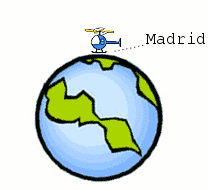What’s a logical paradox?
Preface
 This was written in 2009. (Revised 2022.) It explains the notion of a logical paradox in a way that comes naturally to me. The conclusion drawn at the end is probably the main thing for me (“We are blinder than we can imagine in matters of straightforward logical reasoning”) but it is not always emphasized by others!
This was written in 2009. (Revised 2022.) It explains the notion of a logical paradox in a way that comes naturally to me. The conclusion drawn at the end is probably the main thing for me (“We are blinder than we can imagine in matters of straightforward logical reasoning”) but it is not always emphasized by others!
 This was written in 2009. (Revised 2022.) It explains the notion of a logical paradox in a way that comes naturally to me. The conclusion drawn at the end is probably the main thing for me (“We are blinder than we can imagine in matters of straightforward logical reasoning”) but it is not always emphasized by others!
This was written in 2009. (Revised 2022.) It explains the notion of a logical paradox in a way that comes naturally to me. The conclusion drawn at the end is probably the main thing for me (“We are blinder than we can imagine in matters of straightforward logical reasoning”) but it is not always emphasized by others!
3. Rejecting the reasoning
 A certain wealthy man, who happens to own a helicopter, needs to travel from Madrid, where he lives, to New York.
A certain wealthy man, who happens to own a helicopter, needs to travel from Madrid, where he lives, to New York.
He notices that Madrid and New York lie at the same latitude on the globe, six hours apart, and hits upon the following bright idea. Why not get in the helicopter, hover steadily in the air, and simply let the Earth rotate beneath. In six hours, New York would rotate into view, and the helicopter may be lowered back to the ground.
The man’s logic sounds fairly straightforward but also too good to be true. How can it be that easy to cross the Atlantic? Even a jet plane needs about eight hours for the trip, pushing its engines hard. Why would airlines be expending all that effort if this man’s method were available?
And yet what was wrong with his reasoning? Can no helicopter hover in the air for six straight hours? Would the Atlantic winds blow it away? Are Madrid and New York perhaps not quite at the same latitude on the globe?
No, the trouble is that the man has just overlooked the Law of Inertia. If he tried his own suggestion, he would be dismayed to find that his helicopter would simply inherit the inertia of the rotating Earth, and would thus remain fixed above Madrid, rotating in space together with the Earth.
So the man’s reasoning does not compel for long. Of course, it’s easy for us to say this now, since we stand on the shoulders of Copernicus, Galileo and Newton, who taught us the Law of Inertia. But there was a time when the man’s logic would have been readily accepted. The famed 16th-century Danish astronomer Tycho Brahe, for example, didn’t see anything wrong with it:
But never mind Tycho Brahe. Our larger point is that this is the opposite sort of case from the previous one. We started again with a “compelling” line of reasoning that leads to an “unbelievable” conclusion—namely, in this case, that you can get from Madrid to New York in six hours simply by hovering in a helicopter! This time, however, rather than swallow the conclusion, the right thing to do is to “reject the reasoning.” The reasoning doesn’t work because it overlooks the Law of Inertia.
To drive this home, let’s consider another example in which a logical paradox is swiftly resolved by “rejecting the reasoning.” What follows is an old mathematical paradox in which we seem able to prove that \( 2 = 1 \). Such a conclusion would be “unbelievable,” of course, but it appears to be backed by the following “compelling” reasoning:
Start with two equal, non-zero numbers \( a \) and \( b \):
\( a=b \)
It follows, in six self-evident steps, that:
If you have never seen this “proof” before, take a moment to figure out what may have gone wrong here because the conclusion is most certainly paradoxical!
There is no question but that something must be wrong with the reasoning because the conclusion that \( 2 = 1 \) cannot possibly be swallowed. The flaw in the reasoning, as you may have determined, was to divide by zero midway through the “proof,” which is an illegitimate mathematical maneouvre. This happened when we divided both sides of the equation by \( (a - b) \) in the third of the six steps above. This quantity is zero, since \( a = b \). So the mathematical reasoning falters at that point and may simply be rejected. This resolves the paradox.
Swallow the conclusion or reject the reasoning? These are essentially our options when confronted with a “compelling” piece of reasoning for an “unbelievable” conclusion, and we have now seen some simple instances of doing the one or the other.
We should now consider some notorious cases where even highly sensible people cannot agree on which way to go—on whether to swallow the conclusion or to reject the reasoning—even after prolonged discussion and debate. This is when we start to approach a genuine logical paradox.

He notices that Madrid and New York lie at the same latitude on the globe, six hours apart, and hits upon the following bright idea. Why not get in the helicopter, hover steadily in the air, and simply let the Earth rotate beneath. In six hours, New York would rotate into view, and the helicopter may be lowered back to the ground.
The man’s logic sounds fairly straightforward but also too good to be true. How can it be that easy to cross the Atlantic? Even a jet plane needs about eight hours for the trip, pushing its engines hard. Why would airlines be expending all that effort if this man’s method were available?
And yet what was wrong with his reasoning? Can no helicopter hover in the air for six straight hours? Would the Atlantic winds blow it away? Are Madrid and New York perhaps not quite at the same latitude on the globe?
No, the trouble is that the man has just overlooked the Law of Inertia. If he tried his own suggestion, he would be dismayed to find that his helicopter would simply inherit the inertia of the rotating Earth, and would thus remain fixed above Madrid, rotating in space together with the Earth.
So the man’s reasoning does not compel for long. Of course, it’s easy for us to say this now, since we stand on the shoulders of Copernicus, Galileo and Newton, who taught us the Law of Inertia. But there was a time when the man’s logic would have been readily accepted. The famed 16th-century Danish astronomer Tycho Brahe, for example, didn’t see anything wrong with it:
Some suppose that a projectile that is launched upward from, and falls back to, the deck of a ship will land in the same place whether the ship is at rest or moving. On the contrary, the faster the ship moves, the more discrepancy is seen in the landing. And likewise ought to happen in regards to the rotation of the Earth. (Astronomical Letters.)
But never mind Tycho Brahe. Our larger point is that this is the opposite sort of case from the previous one. We started again with a “compelling” line of reasoning that leads to an “unbelievable” conclusion—namely, in this case, that you can get from Madrid to New York in six hours simply by hovering in a helicopter! This time, however, rather than swallow the conclusion, the right thing to do is to “reject the reasoning.” The reasoning doesn’t work because it overlooks the Law of Inertia.
⚹
To drive this home, let’s consider another example in which a logical paradox is swiftly resolved by “rejecting the reasoning.” What follows is an old mathematical paradox in which we seem able to prove that \( 2 = 1 \). Such a conclusion would be “unbelievable,” of course, but it appears to be backed by the following “compelling” reasoning:
Start with two equal, non-zero numbers \( a \) and \( b \):
\( a=b \)
It follows, in six self-evident steps, that:
\( a^{2} = ab \)
\( a^{2} - b^{2} = ab - b^{2}\)
\( (a+b)(a-b) = b(a-b) \)
\( a+b = b\)
\( 2b = b \)
\( 2 = 1 \)
\( a^{2} - b^{2} = ab - b^{2}\)
\( (a+b)(a-b) = b(a-b) \)
\( a+b = b\)
\( 2b = b \)
\( 2 = 1 \)
If you have never seen this “proof” before, take a moment to figure out what may have gone wrong here because the conclusion is most certainly paradoxical!
There is no question but that something must be wrong with the reasoning because the conclusion that \( 2 = 1 \) cannot possibly be swallowed. The flaw in the reasoning, as you may have determined, was to divide by zero midway through the “proof,” which is an illegitimate mathematical maneouvre. This happened when we divided both sides of the equation by \( (a - b) \) in the third of the six steps above. This quantity is zero, since \( a = b \). So the mathematical reasoning falters at that point and may simply be rejected. This resolves the paradox.
⚹
Swallow the conclusion or reject the reasoning? These are essentially our options when confronted with a “compelling” piece of reasoning for an “unbelievable” conclusion, and we have now seen some simple instances of doing the one or the other.
We should now consider some notorious cases where even highly sensible people cannot agree on which way to go—on whether to swallow the conclusion or to reject the reasoning—even after prolonged discussion and debate. This is when we start to approach a genuine logical paradox.
Menu
 What’s a logical paradox?
What’s a logical paradox? Achilles & the tortoise
Achilles & the tortoise The surprise exam
The surprise exam Newcomb’s problem
Newcomb’s problem Newcomb’s problem (sassy version)
Newcomb’s problem (sassy version) Seeing and being
Seeing and being Logic test!
Logic test! Philosophers say the strangest things
Philosophers say the strangest things Favourite puzzles
Favourite puzzles Books on consciousness
Books on consciousness Philosophy videos
Philosophy videos Phinteresting
Phinteresting Philosopher biographies
Philosopher biographies Philosopher birthdays
Philosopher birthdays Draft
Draftbarang 2009-2024  wayback machine
wayback machine
 wayback machine
wayback machine


